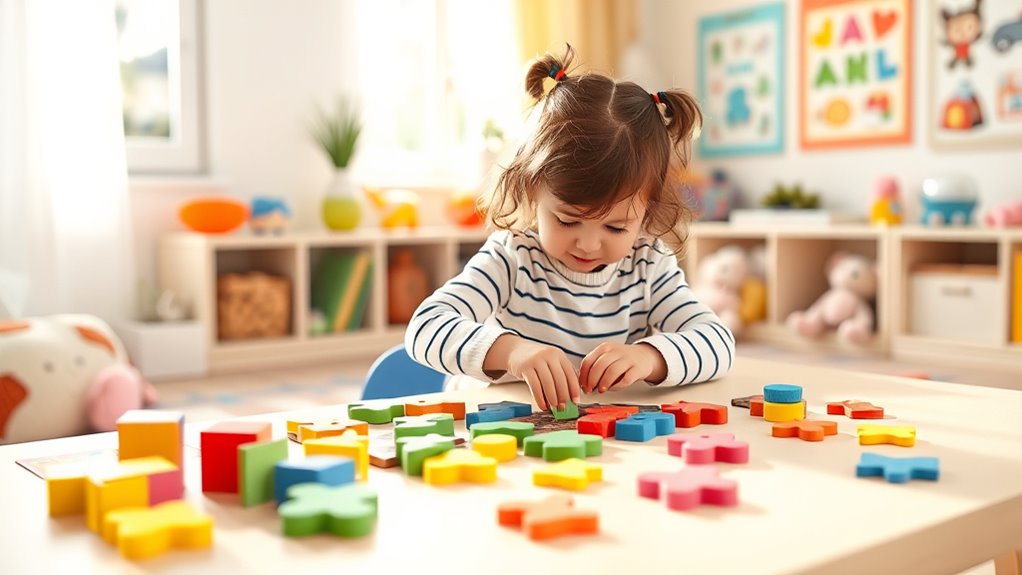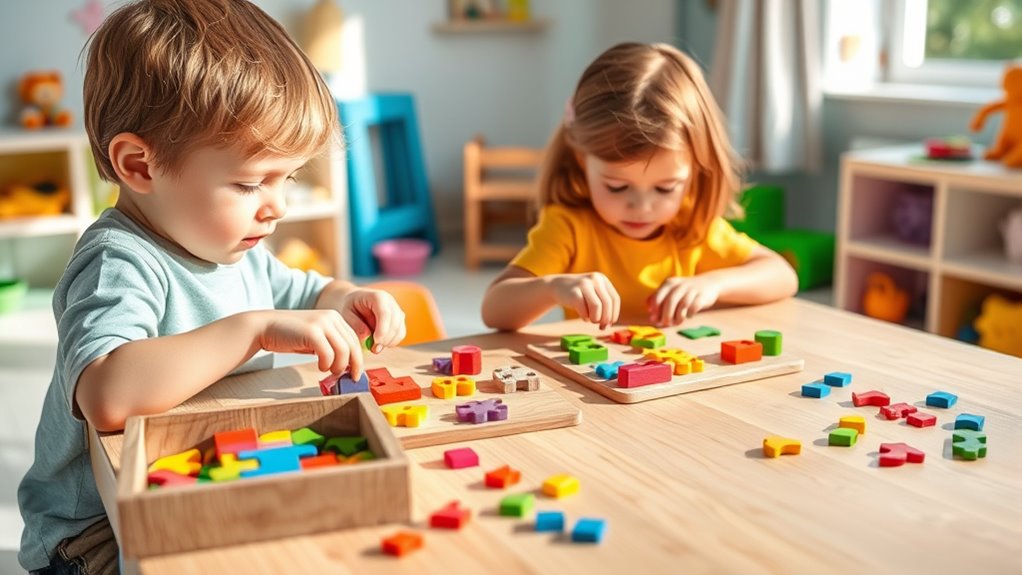To help your tots develop problem-solving skills, involve them in simple puzzles, stacking toys, and shape-matching games that boost fine motor skills and visual discrimination. These activities improve hand-eye coordination, spatial awareness, and logical thinking. As they analyze shapes, sizes, and object relationships, they build critical thinking skills. Keep encouraging playful exploration, and you’ll discover more effective ways to nurture their growing problem-solving abilities along the way.
Key Takeaways
- Simple puzzles like shape sorting and matching enhance spatial awareness and problem-solving skills in young children.
- Sorting games improve visual discrimination, helping tots recognize differences and similarities between objects.
- Stacking and building activities develop fine motor skills and logical thinking through sequencing.
- Storytelling with puzzles encourages reasoning, sequencing, and understanding cause-and-effect relationships.
- Hands-on activities that combine visual discrimination and manipulation foster critical thinking and problem-solving abilities.

Have you ever wondered how young children develop their problem-solving skills? It’s a fascinating process that begins early and grows stronger as they explore their surroundings. One of the key ways children improve their problem-solving abilities is through activities that enhance their fine motor skills. These skills involve the small muscles in their hands and fingers, which are essential for tasks like grasping, manipulating objects, and completing puzzles. When kids engage in simple puzzles or stacking games, they’re not just having fun—they’re practicing hand-eye coordination and spatial awareness, both of which are crucial for logical thinking. As they pick up pieces, turn them over, and fit them into the right spots, they’re learning to analyze shapes, sizes, and relationships between objects, laying the groundwork for more complex problem-solving in the future.
In addition to puzzles, storytelling activities play a vital role in developing a child’s reasoning and critical thinking skills. When you encourage your child to tell stories, you’re helping them organize their thoughts, recall sequences, and understand cause-and-effect relationships. These activities stimulate their imagination while also challenging them to think about different scenarios, which enhances their ability to solve problems creatively. For instance, asking questions like “What do you think will happen next?” or “How would you solve this problem if you were the character?” invites children to consider various solutions and viewpoints. This kind of engagement nurtures their logical reasoning and helps them understand that problems often have multiple solutions.
You can incorporate storytelling into their playtime by using picture books, puppets, or even encouraging them to narrate their own stories based on their experiences. As they weave stories, they practice sequencing—understanding the order of events—which is fundamental for problem-solving. When children narrate stories involving characters facing challenges, they learn to think critically about how those characters might resolve their issues. This process not only builds their vocabulary but also sharpens their ability to analyze situations and make decisions. Additionally, engaging in activities that promote visual discrimination helps children recognize differences and similarities between objects, further supporting their development of logical thinking skills.
Frequently Asked Questions
What Are the Best Age-Appropriate Puzzles for Toddlers?
You should choose puzzles that are perfect for your toddler’s age to support shape recognition and fine motor skills. Look for chunky, colorful puzzles with easy-to-handle pieces that fit well in little hands. Simple puzzles with large pieces and familiar shapes help your child develop problem-solving skills and hand-eye coordination. As they grow, gradually introduce more complex puzzles to challenge their thinking while keeping the activity fun and engaging.
How Can Parents Encourage Independent Problem Solving?
To encourage independent problem solving, you should foster curiosity and patience in your child. Offer age-appropriate puzzles and games that challenge them without frustration. Let them explore solutions on their own, offering gentle guidance when needed. Celebrate their efforts to build confidence. By encouraging curiosity and fostering patience, you help your child develop the skills to think critically and solve problems independently over time.
Are There Any Safety Concerns With Certain Puzzle Materials?
Oh, the thrilling world of toddler puzzles—where non-toxic materials are a must and choking hazards are the villain lurking in every tiny piece. You’ll want to double-check that puzzle pieces are sturdy, free of harmful chemicals, and too big to swallow. After all, your little explorer’s safety depends on choosing puzzles that won’t turn into a dangerous game of “find the choking hazard.” Keep safety first, and puzzles can be fun and worry-free!
How Long Should a Toddler Engage With Puzzles Daily?
You should aim for about 10-15 minutes of puzzle playtime daily, fitting into your toddler’s playtime routines. This duration supports their developmental milestones without causing frustration or fatigue. Keep an eye on their interest levels, and if they enjoy it, you can gradually extend the time. Engaging in puzzles regularly helps boost their problem-solving skills, fine motor development, and confidence. Always prioritize safety and age-appropriate materials.
Can Puzzle Play Improve Language Development in Young Children?
Imagine a toddler naming puzzle pieces, and soon they’re saying “dog” and “car” clearly. Puzzle play can boost language development by encouraging children to reach language milestones faster. It helps expand vocabulary, as they learn new words for objects and actions. Engaging in puzzles regularly supports their cognitive growth and language skills simultaneously, making learning fun and interactive while you watch their communication blossom.
Conclusion
You might think that young children can’t handle complex puzzles, but research shows that early problem solving boosts their brain development. By engaging tots with simple games, you’re helping them build critical thinking skills that last a lifetime. So, don’t underestimate the power of play—it’s more than just fun. When you introduce these activities, you’re laying the foundation for confident, clever problem solvers. Trust in the process; your little one’s future skills are taking shape today.










